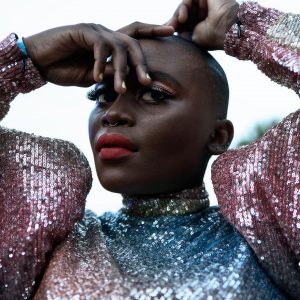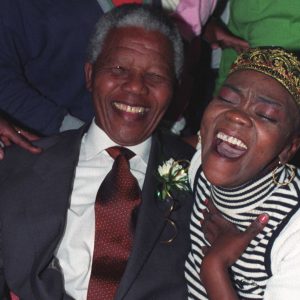‘Inganekwane’ and ‘Chosi’ in sacred conversation
Released just weeks apart in June, Zoë Modiga and Buhlebendalo Mda’s new albums speak to the political realities of our time and can be listened to in tandem.
Author:
13 July 2020

The distance between 21 days was closed when Zoë Modiga released her new album, Inganekwane, following the release of Buhlebendalo Mda’s Chosi just three weeks earlier.
These two bodies of work, occupying the number one and two slots on the Apple Music World Chart following their release, seem to call to be listened to and appreciated together. Through their musical stories and intellectual offerings rooted in reality, they speak to our present and to each other.
Modiga opens her album, the title referring to a fairy tale or story in IsiZulu, by proclaiming: “Kwasukasukela (Once upon a time).” The audience responds by saying, cosi or Chosi, “we are listening”.
Related article:
The albums are connected, too, in their visuals. Both covers are rooted in the sacred. In an image by Tatenda Chidora, Modiga is pictured inside a cattle kraal. Isibaya or Ub’hlanti, kraal in Zulu custom, is a sacred place, as could be the same with most African cultures on the southern tip of Africa. Even if you are without cattle, it is mandatory that you have Isibaya. The placing of Modiga at the centre of this sacred place, surrounded by cattle, is a subtle hint that the story she is about to tell is more than just a fairy tale.
“As a child … I would visit my paternal grandmother, where I was fascinated and drawn to the nature of cows,” Modiga says in the press material that accompanied the album’s release.
“I would stare into the eyes of cows and watch them chewing the cud, and I’d feel as though it was a moment of true divinity with an overflowing peace. I would later learn that cows bear much cultural significance by providing food and clothing, they are our sense of wealth, our sacred offering, our inspiration for song and storytelling. I realise now that, truly, they are at the heart of our memory and history as a people.”
On the cover of Chosi, Mda is draped in a healer’s white beads with ibhayi wrapped around her arm while she smokes inqawe or umbheka phesheya. In an interview with presenter Azania Mosaka on Radio 702, Mda says, “I think if I did not go for initiation, I would not have an album.” Through the training of becoming a healer, “I discovered parts of me that did not exist”.
Chosi takes the listener through this journey of self-discovery. The first song, Vusela ft Mthetheleli Gongotha, sets the tone of self-discovery embodied by the album. Gongotha recites what sounds like praise poetry with Mda’s beautiful harmonies, as we learn that Mda is not at ease with the lack of unity and landlessness of black people and is seeking change.
With Vusela, the listener immediately realises that the popular sonic elements of a capella group The Soil are still present in Mda’s new sound as she takes on her first project as a solo artist, in which she features artists including the legendary Madala Kunene.
Radical songs rooted in the lived
In this global moment of reckoning with historical sites of struggle, these two black women implore us to truly listen. Through their work, listening is a revolutionary act as they communicate messages of freedom, blackness, spirituality and decolonisation through song.
The principle of listening is expressed in both albums in the context of older people listening to the youth. In Isegazini, Modiga sings “ngicela ningizwe ngifuna ukushintsha umhlaba” , meaning “please listen to me, I want to change the world”. In Buya Azania, Mda sings “mamelani abantwana”, urging for the youth to be listening to and bringing attention to the land question and contemporary struggles for true belonging and freedom. Modiga echoes this sentiment in Intsha, pointing to the youth being resilient and fighting for total liberation.
One of the struggles that Mda points to regularly in Chosi is gender-based violence and femicide. “I am really passionate about women, I am passionate about children, I am passionate about the LGBTQIA+ community, so these are issues that need to be addressed and the only way I can preach is through music,” Mda told Mosaka.
Related article:
Through songs like Mdali, Ntab’ezimnyama and Umenzani, Mda portrays the patriarchal, gendered violence in South African society. In Umenzani, she calls out the person with the authority to directly address the issue of femicide. Mda sings, “Bab’umengameli naka isizwe sakho. Vikela abantu abakho ngoba siyashabalala”, calling on the president to look after the nation and its people because, as things stand, “we are perishing”. Mda also criticises the non-interventionist stance that neighbours aware of abuse have adopted.
She tells Mosaka: “There’s no other way for me, really, to portray a message so that people understand what we as women go through on a day-to-day basis.”
These are no lullabies. They are radical songs, a product of the lived reality of many people in our country. Songs like Abantu, Intsha from Modiga, and Buya Azania and Salute from Mda speak directly to conditions of landlessness and resistance by the youth. The songs reflect Pumla Dineo Gqola’s observations in the book Becoming Worthy Ancestors that “women intellectual-activists continue to see the connections between intellectual thought and political reality in contemporary South Africa”.
Women’s intellectual agency
The presence of musical influences from past eras can often do more than point to inspiration.
Gqola writes: “The project of uncovering and sometimes recovering women’s voices from previous eras is about bringing to the fore the historical variety of women’s intellectual agency at the same time that the contemporary project generates new forms of feminist intellectual agency.”
Mda brings the late Brenda Fassie back to life on her album, not only with the resemblance in voice but also through the cover of Fassie’s hit song, Too Late for Mama.
“I think Brenda Fassie lives within me. I always wanted to be Brenda Fassie growing up,” Mda told Mosaka.
As Mda reintroduces herself as a solo artist with Chosi, writing herself into history, she simultaneously remembers our pop ancestor, introducing her to new audiences and ensuring that her legacy lives on. Whether intentionally or not, Mda refuses to be complicit in the disremembering and erasure of women that came before and influenced her craft.
In Salute, she again works in the realm of memory. Sung slowly, as harmonies meet bass guitar, her rendition of the Umkhonto weSizwe struggle song for fallen soldiers, Hamba Kahle Mkhonto, is a tribute to revolutionary Winnie Madikizela-Mandela and women’s independence.
Related article:
Her work here in memory and activism connects to Modiga’s Mdali, where Modiga says artistically that it is up to the present generation to fulfil our dreams and the ambitions of those before us. She sings, “Amaphupho akudala, sizowafeza kanjani na? Bayasidinga. Basicelile! Bayasidinga! … Likhona ithemba ukuthi amaphupho abo azofezeka …”, questioning the fulfilment of old dreams, saying that those who came before us need us, and that “there is hope that through us these dreams will be a reality”.
While they affirm previous generations, the music of Inganekwane and Chosi is focused directly on current oppressive conditions in South Africa. Their efforts connect to the words of Martinique thinker Frantz Fanon in discovering the mission of a generation. Modiga says in the album’s promotional material that “the messages are running through time, and I think they are given to different people, to pass the baton to those people to say, okay, this is what the message of the times are. People from the past are not necessarily able to accomplish all of that. By learning about ourselves, we are able to carry those messages through.”
Gestures in hope
“Chosi chosi yaphela (I have come to the end of the story)!”, Modiga proclaims in her last song. The laws of storytelling require the audience to respond and appreciate the storyteller by acknowledging that they enjoyed the story by saying, “Yaze yamnandi inganekwane yakho!” in praise.
In the midst of uncertainty – at a time when we are all coming face to face with death, and in a perpetual state of panic and protest – these soothing albums give us a sense of hope that “zizojik’izinto”, indeed things will change, as Modiga sings in Abantu. With Inganekwane and Chosi, Modiga and Mda have produced two albums in chorus with one other, simultaneously rooted in reality and insistently asking for change.



